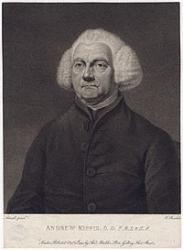Author: Andrew Kippis

Kippis, Andrew, D.D., was born at Nottingham, March 28,1725, and educated for the ministry under Dr. Doddridge at Northampton, 1741-46. After a short residence with congregations at Boston and Dorking, he settled in London in 1753, as minister of the Princes Street Chapel, Westminster. There lie remained till his death in 1795, holding rank as the leading Presbyterian minister in the metropolis. For many years he was classical tutor at the Hoxton Academy, and afterwards at the Hackney College. He contributed largely to the Gentleman's Magazine and the Monthly Review, and edited five volumes of a new edition of the Biographia Britannica, a work commenced in 1778, and interrupted by his death on Oct. 8, 1795. His Life of Captain Cook was also…
Go to person page >Tune
DUKE STREETFirst published anonymously in Henry Boyd's Select Collection of Psalm and Hymn Tunes (1793), DUKE STREET was credited to John Hatton (b. Warrington, England, c. 1710; d, St. Helen's, Lancaster, England, 1793) in William Dixon's Euphonia (1805). Virtually nothing is known about Hatton, its composer,…
Go to tune page >
OLD HUNDREDTHThis tune is likely the work of the composer named here, but has also been attributed to others as shown in the instances list below.
According to the Handbook to the Baptist Hymnal (1992), Old 100th first appeared in the Genevan Psalter, and "the first half of the tune contains phrases which may ha…
Go to tune page >
TRURO (Williams)TRURO is an anonymous tune, first published in Thomas Williams's Psalmodia Evangelica, (second vol., 1789) as a setting for Isaac Watts' "Now to the Lord a noble song." Virtually nothing is known about this eighteenth-century British editor of the two-volume Psalmodia Evangelica, a collection of thr…
Go to tune page >